Dream Lover: Uncut
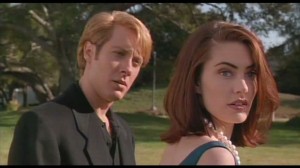 Trends are rarely more than coincidences. Sure, there are always going to be imitators of success, such as Madonna making Body of Evidence to capitalize on the trend of the erotic thriller genre that goes back to Basic Instinct a year earlier (though the genre existed before, it just didn’t have a name). But realize that movies often take years to produce from the script down to the finished product, with any number of unknowable obstacles in its way. The cash-in can be produced quickly because there is very little thought put into a screenplay, and sometimes the film begins without a completed screenplay at all. The higher quality the film, the more likely it spent a long time being developed, and the more dated it might seem by the time it comes out.
Trends are rarely more than coincidences. Sure, there are always going to be imitators of success, such as Madonna making Body of Evidence to capitalize on the trend of the erotic thriller genre that goes back to Basic Instinct a year earlier (though the genre existed before, it just didn’t have a name). But realize that movies often take years to produce from the script down to the finished product, with any number of unknowable obstacles in its way. The cash-in can be produced quickly because there is very little thought put into a screenplay, and sometimes the film begins without a completed screenplay at all. The higher quality the film, the more likely it spent a long time being developed, and the more dated it might seem by the time it comes out.
 Take Nicholas Kazan’s Dream Lover, which if you take a look at the poster, suggests that the marketing department thought it was just another erotic thriller (like Traces of Red or Body of Evidence) mixed with the blank-from-hell genre. In other words, not much different than a low-rent Fatal Attraction, with James Spader replacing Michael Douglas and Mädchen Amick replacing Glenn Close as the spurned lover seeking revenge. But that’s not what Dream Lover* is at all, and pigeonholing it as such isn’t fair.
Take Nicholas Kazan’s Dream Lover, which if you take a look at the poster, suggests that the marketing department thought it was just another erotic thriller (like Traces of Red or Body of Evidence) mixed with the blank-from-hell genre. In other words, not much different than a low-rent Fatal Attraction, with James Spader replacing Michael Douglas and Mädchen Amick replacing Glenn Close as the spurned lover seeking revenge. But that’s not what Dream Lover* is at all, and pigeonholing it as such isn’t fair.
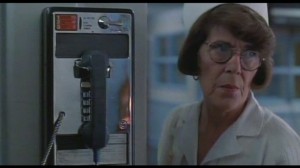 You have take a look at Kazan’s history as a screenwriter, such as his acclaimed screenplay for Reversal of Fortune, which was told from the perspective of Sunny Von Bulow (Glenn Close) and we can see that it’s more irritating for her husband Claus (Jeremy Irons) that this situation threatens his upper crust life, ignoring the fact that he might go to jail for poisoning her. The hero of the film is actually Alan Dershowitz (of course, since the film is based on his book), Claus’ attorney, though the film is more of a dark comedy than a courtroom drama.
You have take a look at Kazan’s history as a screenwriter, such as his acclaimed screenplay for Reversal of Fortune, which was told from the perspective of Sunny Von Bulow (Glenn Close) and we can see that it’s more irritating for her husband Claus (Jeremy Irons) that this situation threatens his upper crust life, ignoring the fact that he might go to jail for poisoning her. The hero of the film is actually Alan Dershowitz (of course, since the film is based on his book), Claus’ attorney, though the film is more of a dark comedy than a courtroom drama.
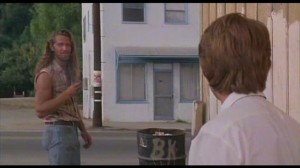 In Dream Lover, Kazan tells basically the same story, but from the perspective of Claus, or at least the wealthy party that is aggrieved by his wife’s actions (it can’t be a coincidence that Dream Lover was co-produced by Dershowitz’s son Elon). Spader, playing Ray Reardon, is an affluent architect who comes from money, and rather than give his standard performance of smugness and distance, using intense, but blank, removed stares, he actually emotes with his lips too, suggesting that there’s more going on than just a slimy scoundrel who we should feel sorry for simply because his livelihood is threatened.
In Dream Lover, Kazan tells basically the same story, but from the perspective of Claus, or at least the wealthy party that is aggrieved by his wife’s actions (it can’t be a coincidence that Dream Lover was co-produced by Dershowitz’s son Elon). Spader, playing Ray Reardon, is an affluent architect who comes from money, and rather than give his standard performance of smugness and distance, using intense, but blank, removed stares, he actually emotes with his lips too, suggesting that there’s more going on than just a slimy scoundrel who we should feel sorry for simply because his livelihood is threatened.
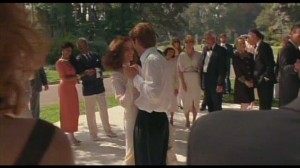 Lots of Kazan’s choices play into Spader’s performance, especially hiring composer Christopher Young to write the score. Young was mostly know for his scores for horror films like Hellraiser, Invaders from Mars, and some of the sequels to A Nightmare on Elm Street and The Fly. Because we’re watching the film from Ray’s perspective, everything that happens to him, from the mysterious beautiful girl, Lena, who enters his life, marries him, has kids with him and betrays him, is horrific, so we think we’re watching a horror film. But what we’re actually seeing is snapshots from a life of paranoia, exacerbated by fantasy sequences with Ray at the circus, goaded by aggressive clowns into questioning his personal choices. The way Ray sees it, the dialogue spoken to him, “bad things can just come out of nowhere,” is not just prophetic, but a reason we should feel sorry for him. How could he have known what Lena was like?
Lots of Kazan’s choices play into Spader’s performance, especially hiring composer Christopher Young to write the score. Young was mostly know for his scores for horror films like Hellraiser, Invaders from Mars, and some of the sequels to A Nightmare on Elm Street and The Fly. Because we’re watching the film from Ray’s perspective, everything that happens to him, from the mysterious beautiful girl, Lena, who enters his life, marries him, has kids with him and betrays him, is horrific, so we think we’re watching a horror film. But what we’re actually seeing is snapshots from a life of paranoia, exacerbated by fantasy sequences with Ray at the circus, goaded by aggressive clowns into questioning his personal choices. The way Ray sees it, the dialogue spoken to him, “bad things can just come out of nowhere,” is not just prophetic, but a reason we should feel sorry for him. How could he have known what Lena was like?
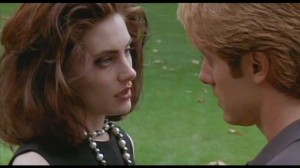 Should he have seen the signs coming? When Lena tells Ray that it would be better not to have dinner with her friend Debbie and her husband because he’s “an unusual combination, he’s a psychopath and he’s boring,” is that foreshadowing or Lena’s little dig at what’s to come?
Should he have seen the signs coming? When Lena tells Ray that it would be better not to have dinner with her friend Debbie and her husband because he’s “an unusual combination, he’s a psychopath and he’s boring,” is that foreshadowing or Lena’s little dig at what’s to come?
 However, that’s not really fair, as the conspiracies that Ray creates in his head might be plausible to him, but would hardly make sense to an outside party. Dream Lover jumps forward in time a lot, and tying up all the loose ends that Ray discovers (or thinks he discovers) about Lena’s past that may sound suspicious are just strands of information let out over years. In Ray’s head it’s just one thing after another, but is that really true?**
However, that’s not really fair, as the conspiracies that Ray creates in his head might be plausible to him, but would hardly make sense to an outside party. Dream Lover jumps forward in time a lot, and tying up all the loose ends that Ray discovers (or thinks he discovers) about Lena’s past that may sound suspicious are just strands of information let out over years. In Ray’s head it’s just one thing after another, but is that really true?**
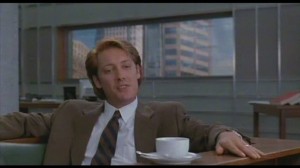 Kazan puts us in the position where we root for Ray, which would make us just as sexist as the movie appears to be. Lena says something to Ray that suggests she believes that love is just self-fulfilling prophecy, which can also be said about how Ray disrupts his marriage. He wants to find dirt, so he’ll end up finding it somewhere and make a conspiracy out of the whole thing. Ray is asking us to make judgments when we don’t have all the information, as if we watched Francois Ozon’s 5×2, a portrait of a single marriage from five different points in time, from when they meet all the way to the divorce and thought we could fill in the backstory all on our own and be sure we’re right instead of just guessing. Are we to make something of a shot where Lena, baiting Ray, swings around a column like a stripper around a pole, since Ray, in one of their earliest scenes together, remarks that the columns in Lena’s house are the same as the one in his office. Ray’s an architect, which means he builds things, and Lena, according to Ray, is someone who replicates a fantasy and then destroys it piece by piece. Does Ray actually see the columns in her house, or is he prophesying his own doom?
Kazan puts us in the position where we root for Ray, which would make us just as sexist as the movie appears to be. Lena says something to Ray that suggests she believes that love is just self-fulfilling prophecy, which can also be said about how Ray disrupts his marriage. He wants to find dirt, so he’ll end up finding it somewhere and make a conspiracy out of the whole thing. Ray is asking us to make judgments when we don’t have all the information, as if we watched Francois Ozon’s 5×2, a portrait of a single marriage from five different points in time, from when they meet all the way to the divorce and thought we could fill in the backstory all on our own and be sure we’re right instead of just guessing. Are we to make something of a shot where Lena, baiting Ray, swings around a column like a stripper around a pole, since Ray, in one of their earliest scenes together, remarks that the columns in Lena’s house are the same as the one in his office. Ray’s an architect, which means he builds things, and Lena, according to Ray, is someone who replicates a fantasy and then destroys it piece by piece. Does Ray actually see the columns in her house, or is he prophesying his own doom?
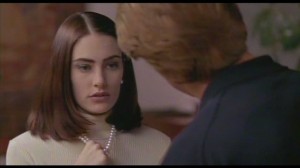 Or maybe those columns were just an architectural trend at the time? It couldn’t just be a coincidence.
Or maybe those columns were just an architectural trend at the time? It couldn’t just be a coincidence.
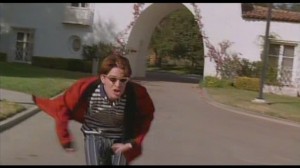 * There are two strange coincidences in the film that reflect “trends.” First, there’s a wedding scene rife with suspicion about a spouse’s mysterious past that’s chalked up to the wife being more of a loner and a go-getter, which is very similar to that same scene in So I Married an Axe Murderer, also released in 1993. And, from another 1993 film, Sliver, which Sharon Stone got as a result of Basic Instinct, there’s a scene in Dream Lover where Bess Armstrong, as Spader’s lawyer friend makes the same facial expression during a restaurant dinner, as Stone does with William Baldwin when he dares her to remove her panties at a public restaurant. It’s a very specific combination of embarrassment and giddiness.
* There are two strange coincidences in the film that reflect “trends.” First, there’s a wedding scene rife with suspicion about a spouse’s mysterious past that’s chalked up to the wife being more of a loner and a go-getter, which is very similar to that same scene in So I Married an Axe Murderer, also released in 1993. And, from another 1993 film, Sliver, which Sharon Stone got as a result of Basic Instinct, there’s a scene in Dream Lover where Bess Armstrong, as Spader’s lawyer friend makes the same facial expression during a restaurant dinner, as Stone does with William Baldwin when he dares her to remove her panties at a public restaurant. It’s a very specific combination of embarrassment and giddiness.
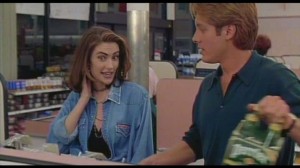 ** The final scene of the film, at least in the director’s cut available on VHS And Laserdisc (the R rated producer’s version on DVD cuts away as two bodies lay on the side of a hill, just like Spader and Deborah Kara Unger did in David Cronenberg’s Crash), suggests that we might be seeing a fantasy from the perspective of someone who cannot handle feminism. It’s no coincidence that Lena attended Swarthmore.
** The final scene of the film, at least in the director’s cut available on VHS And Laserdisc (the R rated producer’s version on DVD cuts away as two bodies lay on the side of a hill, just like Spader and Deborah Kara Unger did in David Cronenberg’s Crash), suggests that we might be seeing a fantasy from the perspective of someone who cannot handle feminism. It’s no coincidence that Lena attended Swarthmore.




Sarah says:
July 15th, 2012
9:45 am
Although Lena did not attend Swathmore…she just said she did; it was another of her lies.